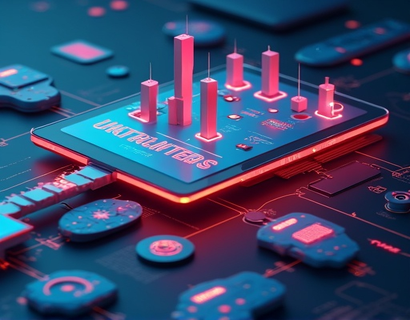Crypto and AI: Empowering Digital Innovation for Enhanced App Ecosystem Experiences
The intersection of cryptocurrency and artificial intelligence (AI) is a fertile ground for digital innovation, offering unprecedented opportunities to transform app ecosystems and enhance user experiences. This article delves into the synergistic relationship between these two cutting-edge technologies, exploring how they are reshaping the digital landscape for tech professionals and early adopters.
The advent of blockchain technology has introduced a new paradigm in digital transactions, providing a decentralized, secure, and transparent way to conduct business. Cryptocurrencies, built on blockchain, have revolutionized the way we think about value, finance, and data ownership. Meanwhile, AI has been rapidly advancing, enabling machines to learn from data, recognize patterns, and make decisions with minimal human intervention. When these two technologies converge, the potential for innovation becomes immense.
Enhancing Security and Trust
One of the most significant benefits of integrating AI with cryptocurrency is the enhancement of security and trust in digital transactions. AI algorithms can analyze vast amounts of data to detect anomalies and potential fraud, ensuring that transactions are secure and trustworthy. Smart contracts, self-executing contracts with the terms directly written into code, can be further fortified by AI to automatically verify and enforce contractual obligations, reducing the risk of disputes and increasing efficiency.
For instance, AI-driven security protocols can monitor blockchain networks in real-time, identifying and mitigating threats before they become significant issues. This proactive approach to security is crucial in a landscape where cyber threats are becoming increasingly sophisticated. By combining the immutability of blockchain with the analytical power of AI, the app ecosystem can offer users a level of security and trust that was previously unattainable.
Personalization and User Experience
AI's ability to process and analyze large datasets makes it an ideal tool for personalizing user experiences. In the context of cryptocurrency and app ecosystems, AI can tailor recommendations, notifications, and interfaces to individual user preferences and behaviors. This level of personalization not only enhances user satisfaction but also increases engagement and retention.
For example, a cryptocurrency wallet app can use AI to learn a user's spending habits and suggest optimal times for transactions based on market conditions, or recommend new assets to invest in based on the user's risk profile and investment goals. Such personalized features can significantly improve the user experience, making the app more intuitive and user-friendly.
Optimizing Market Operations
The cryptocurrency market is characterized by high volatility and complex dynamics. AI can play a pivotal role in optimizing market operations by providing insights and predictive analytics. AI algorithms can analyze historical data, market trends, and real-time news feeds to forecast price movements and identify trading opportunities. This can be particularly valuable for traders and investors looking to make informed decisions.
Moreover, AI can enhance the liquidity of cryptocurrency markets by matching buyers and sellers more efficiently. By analyzing trading patterns and market sentiment, AI can facilitate better price discovery and reduce slippage, ensuring that transactions are executed at the most favorable prices. This not only benefits individual traders but also contributes to the overall health and stability of the market.
Streamlining Development and Deployment
For developers, the integration of AI in the app ecosystem can streamline the development and deployment of blockchain-based applications. AI-powered tools can automate routine tasks such as code optimization, bug detection, and performance testing, allowing developers to focus on more complex and creative aspects of app development. This can accelerate the development cycle and reduce costs.
Additionally, AI can assist in the deployment of decentralized applications (dApps) by optimizing smart contract execution and managing resources more efficiently. For instance, AI can dynamically allocate computing resources based on current demand, ensuring that dApps run smoothly even during peak usage times. This level of automation and optimization is crucial for the widespread adoption of blockchain technology.
Enhancing Data Analytics
Data analytics is a cornerstone of modern app ecosystems, providing valuable insights into user behavior, market trends, and operational efficiency. AI enhances data analytics by enabling more sophisticated analysis and deeper insights. In the context of cryptocurrency, AI can process and interpret complex blockchain data, uncovering patterns and trends that might not be apparent through traditional analysis methods.
For example, AI can analyze transaction data to identify key influencers in the cryptocurrency community, track the flow of funds across different platforms, and predict market sentiment. These insights can be invaluable for app developers and businesses looking to leverage cryptocurrency trends to their advantage. By integrating AI-driven analytics, the app ecosystem can offer more data-driven and strategic decision-making capabilities.
Facilitating Cross-Chain Interoperability
One of the challenges in the cryptocurrency space is the lack of interoperability between different blockchain networks. AI can help bridge this gap by developing intelligent protocols that enable seamless communication and asset transfer across various chains. This interoperability is essential for creating a more unified and efficient ecosystem, where users can interact with multiple blockchain applications without friction.
AI algorithms can analyze the technical specifications and protocols of different blockchains, identifying compatible points of integration. By automating the process of cross-chain transactions, AI can reduce complexity and enhance the user experience, making it easier for users to leverage the strengths of multiple blockchain platforms.
Innovative Financial Products and Services
The combination of cryptocurrency and AI opens up new possibilities for financial products and services. AI can be used to design and manage decentralized finance (DeFi) protocols, offering innovative solutions such as automated lending, borrowing, and yield farming. These protocols can be more accessible, transparent, and efficient compared to traditional financial systems.
For instance, AI-driven DeFi platforms can use machine learning to assess creditworthiness and automate loan approvals, reducing the need for intermediaries and lowering transaction costs. Additionally, AI can optimize portfolio management in DeFi, dynamically adjusting asset allocations based on market conditions and user preferences. These innovative financial products can democratize access to financial services and empower users to manage their assets more effectively.
Challenges and Considerations
While the integration of cryptocurrency and AI presents numerous opportunities, it also comes with challenges that must be addressed. One of the primary concerns is regulatory compliance. The regulatory landscape for cryptocurrencies is still evolving, and AI-driven applications must navigate a complex web of laws and guidelines. Ensuring compliance while leveraging the full potential of these technologies requires a proactive and informed approach.
Another challenge is the technical complexity involved in integrating AI with blockchain. Developing robust and scalable solutions that can handle the high transaction volumes and computational demands of blockchain networks is a significant hurdle. Additionally, ensuring the privacy and security of user data in AI-driven applications is paramount, as the misuse of data can have severe consequences.
Future Prospects
Looking ahead, the synergy between cryptocurrency and AI is poised to drive further innovation and transformation in the digital space. As both technologies continue to mature, we can expect to see more sophisticated and integrated solutions that enhance the app ecosystem in unprecedented ways.
For instance, the development of AI-powered virtual assistants within blockchain applications can provide users with personalized guidance and support, making complex processes more accessible. Additionally, the rise of Web3, a decentralized internet powered by blockchain, will benefit greatly from AI's ability to enhance user interactions and data management.
In conclusion, the convergence of cryptocurrency and AI is a powerful force for digital innovation, offering a range of benefits from enhanced security and personalization to optimized market operations and innovative financial products. While challenges exist, the potential for transformative impact is immense, making this an exciting area for tech professionals and early adopters to explore.










































